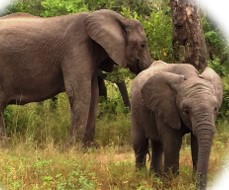Speeches Shim
BACKGROUND
Wildlife crime is threatening both the black and white rhino and elephant populations in the Greater Limpopo Transfrontier Conservation area (GLTFCA), a transboundary area bordering Mozambique, South Africa and Zimbabwe. Poaching and illegal wildlife trade remains an alarming threat to the survival of rhino and elephant species, particularly in the Kruger National Park in South Africa where populations have rapidly declined as the region has become a lucrative rhino poaching hotspot.
Communities living in and around the GLTFCA have a complex relationship with park management. This resulted from historical forced relocations and the loss of access to natural resources and cultural heritage sites due to the creation of protected areas. Many communities derive few benefits from the wildlife yet live with the costs associated with conflict with wildlife, such as the loss of crops or livestock. Communities face further challenges such as poverty, unemployment, food insecurity, and poor access to water, healthcare, education and proper sanitation. These challenges create conditions for criminal syndicates to embed themselves in the community and recruit people, particularly young men, to become involved in wildlife trafficking.
PROGRAM DESCRIPTION
The KHETHA Program aims to halt wildlife trafficking impacts on flagship species in South Africa and Mozambique by building relationships between protected areas and communities, supporting law enforcement to stop wildlife trafficking and engaging all sectors to work together on the issue. More specifically activities are tailored towards promoting cross-border cooperation, improving wildlife related policy frameworks, improving benefits for rural communities, building capacity, developing and applying innovative crime prevention models and understanding of wildlife trafficking dynamics routes.
EXPECTED RESULTS AND IMPACTS
Khetha will increase community awareness of and benefits from wildlife; increase cross-border collaboration and cooperation, increase crime prevention, detection, prosecution and penalties; improve knowledge of wildlife crime dynamics and impacts. In 2018, the project worked with stakeholders to advocate for an amendment in the Mozambican Conservation Area law to allow for an increase in allowed economic benefits from legitimate wildlife revenue. Now all 1,823 registered members of the Mangalane community have improved economic benefits from these activities. It is estimated that the number of registered members will increase to 2,500 by 2019.


Comment
Make a general inquiry or suggest an improvement.